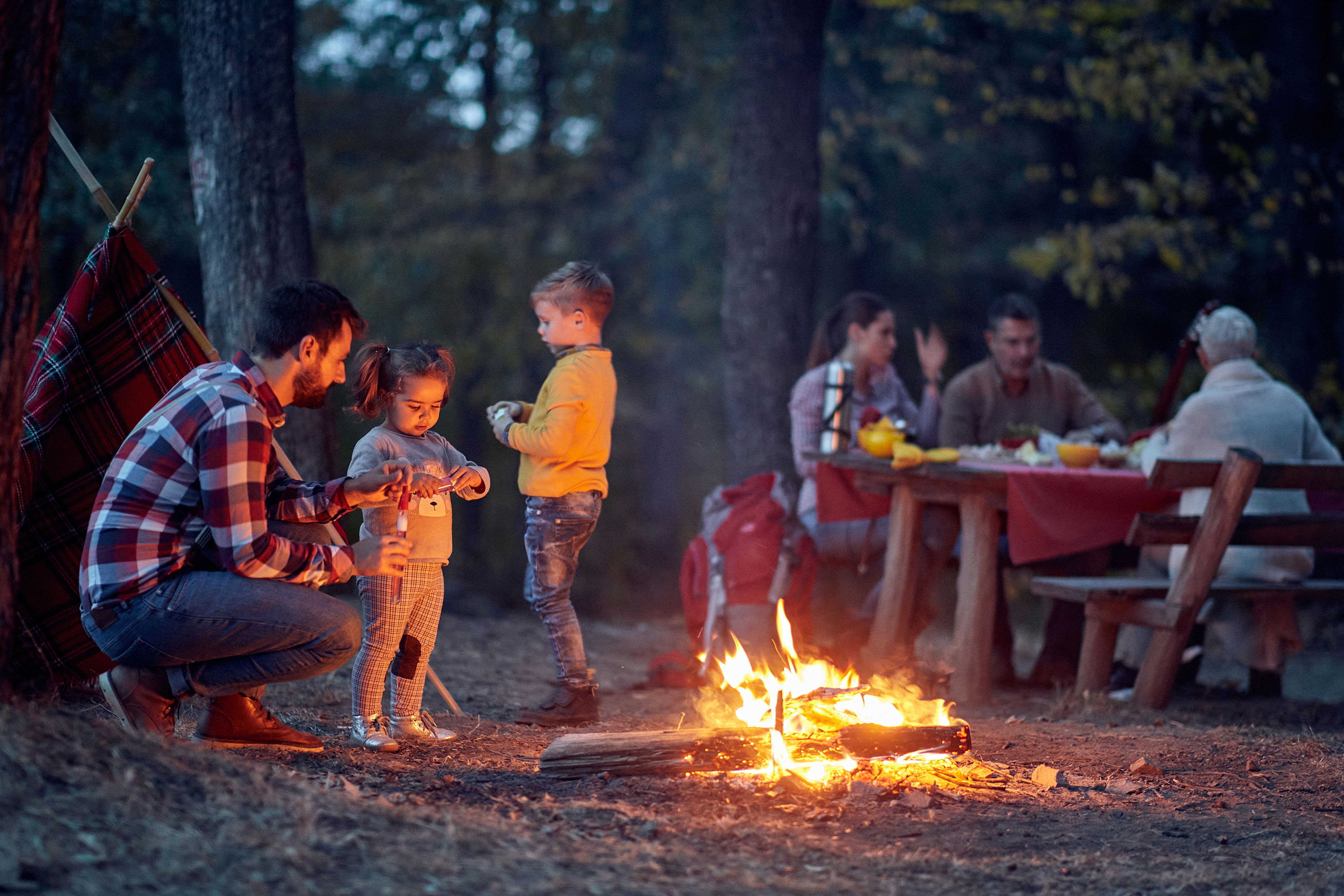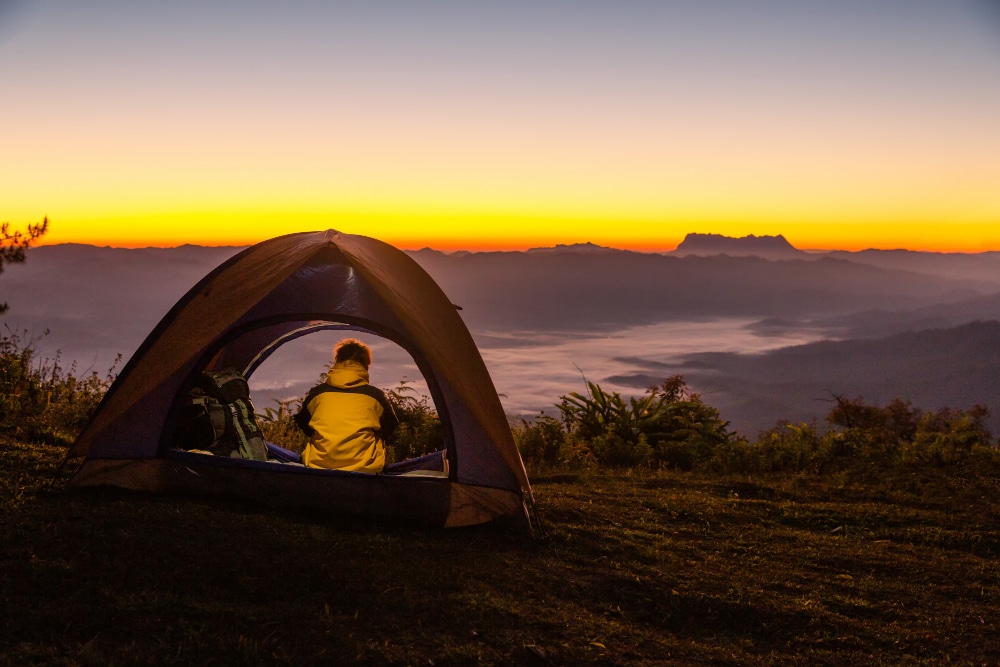Are you a first-time camper? Are you ready to take the plunge and head off into the wilderness for the adventure of a lifetime?

Camping is a fantastic way to explore nature, disconnect from technology, and get closer to the people you love. But before you hit the trails, there are some essential tips and tricks to know that will make your camping experience excellent.
From picking the suitable campsite and packing the right supplies to following safety protocols, this guide will provide you with everything you need to know to make your camping trip enjoyable. So, put on your hiking boots, grab your tent, and get ready to explore the great outdoors.
Get familiar with your camping gear.
To start, make sure you are familiar with each piece of camping gear you have, including the tent, sleeping bags, other bedding, cooking equipment, and other accessories you will use while camping.
Familiarize yourself with each piece, how it works, what maintenance it needs, and how to use it. This way, you will be ready for anything and have fewer frustrations on your trip. Also, read the instructions for all your camping gear.
Getting to know your equipment ensures you have everything you need for your trip, and you will have an easier time setting it up when you arrive at your campsite. Put your tent up at home, dismantle it and try again until you are confident in your abilities.

Make sure your tent is big enough.
When it comes to buying a tent, it can be a good idea to try before you buy. Head to your local camping store and check out the sizes of the different tents and ensure you are comfortable. Don’t just go by measurements alone, especially if this is your first time buying a tent.
It can be a good idea to check for any size limits at your chosen campgrounds to ensure you will be allowed to pitch your tent when you arrive. Ask retailers for their opinions on sizes and features, too, if applicable.
They can advise you on what to expect when sleeping in different styles. The size of your tent is more important if you are going to be sharing with others, whether your significant other, children or family or friends. You will all need enough space to be comfortable, so you sleep well.
Stay close to home for your first trip out.
For your first camping trip, consider staying close to home, especially if you are camping with children or new to the experience.
First-time campers should select a campsite close to home and within their skill level to avoid feeling overwhelmed and out of their element. This will help you become more comfortable with camping and allow you to explore this new passion and skill with less pressure.
When staying close to home, you can experience many of the same things at a campsite further away from civilization. You can still go hiking, explore wildlife, and enjoy the great outdoors while staying in a place that is easier to get to and has more amenities and supplies nearby.
Research your campsite, the rules, and its facilities
Find out as much information as you can about the campsite you choose. This includes the location, the rules, nearby attractions, and the facilities. You don’t want to be stuck with no water or electricity or be too close to the toilets so you can’t get any rest.
You may be visiting a national park, so check the park’s website for information on the rules and facilities. If you are camping with kids, you might want to choose a campsite that has a playground, swimming area, or other fun activities so they don’t get bored. If you have animals, make sure they can come along with you.
Most campsites allow pets, but you will want to check the rules, so you know if there are any restrictions. It is better to know what to expect and what is expected of you before you arrive so nothing is left to chance and you are left without something you presumed would be available such as running water or electricity hookups.
Make a checklist of what you will need.
Before leaving for your trip, make a checklist of everything you need. This includes all of your supplies, food, camping lantern, and first-aid equipment. You may also want to keep track of the weather forecast to prepare for sudden or unforeseen changes.
This will help you avoid forgetting anything essential and help you pack efficiently for your trip. Make sure you have everything you need before you leave. If you have to, make a last-minute trip to the grocery store, it’s straightforward to forget something.
Make a checklist of everything you need to buy, and don’t forget to pack it in your car when you leave. You should also ensure you have all the permits you need to camp in certain areas.
A portable power station will be a good investment.
If you plan to disconnect from technology during your camping trip entirely, that’s great! But if you want to be able to charge your phone and other devices for important communication or emergency reasons or want to watch a movie at the end of the day, having a portable generator for camping will be a good investment.
This will allow you to plug in your devices and keep them charged while enjoying the outdoors. Make sure the power station is waterproof, so if it gets a little wet, it won’t be ruined. And make sure the power station has enough plugs for all your devices, including any battery packs you may have.
This will help keep your devices charged and ready for you when you need them while also allowing you to enjoy the outdoors without any distractions.
Get to your campground early.
Getting to your campground early is an excellent idea for a first-time camper. When you get there, you can familiarize yourself with the area around your campsite and get to know your neighbors. You can also scout out the best places to hike from your campground and plan out what activities you want to do during your trip.
If you get to your campground early, you can also help ease any other first-time campers in your group into the experience. You can show them where they can find the best hiking trails or help them plan their trip.
This means that when it gets dark, you won’t struggle to find your pitch or get acquainted with the area and will be ready to enjoy your night.
Pack appropriate clothing
Before you leave for your camping trip, you should pack clothing appropriate for the season. You don’t want to bring too many heavy items, but you also don’t want to bring too little and be freezing at night. Pick out a few light jackets, a few layers for warmth, long underwear, socks, gloves, and hats. Cotton is a great fabric for outdoor use and is breathable, so it will keep you warm and dry. If you are camping during a warm season, you can always bring a swimsuit to go for a dip in the nearby water. Bring plenty of clean, dry clothes so you can change out of your wet item as soon as you come back from the water.
Avoid camping in harsh weather.
As a first-time camper, you might want to avoid going in high seasons. Certain camping seasons are more popular and more crowded than others. Some camping seasons are busier, while some have harsher weather than others.
If you want to avoid extreme heat, cold, or other severe weather conditions, research your destination and local climate and find the best time to head out until you become more familiar and comfortable with camping and being exposed to the elements.
Plan your meals before you leave home
Before you leave for your camping trip, plan out your meals for the trip. You’ll want to bring foods that are easy to transport and can be eaten in many different ways.
Granola bars, energy bars, trail mix, dried fruit, and peanut butter are great examples of foods you can easily transport and eat in many ways. If you are taking a camping stove, why not pre-make your meals ahead of time, so they just need to be heated, or just prep the foods so you can put them on the stove to cook when you are settled?
Conclusion
Camping is one of America’s favorite vacation options, and as such, you can find so many things to do, excellent sites to see, and experience so many wonderful opportunities.
Camping can be a fun way to disconnect from your life and enjoy stripping things back to basics and reacquainting yourself with nature.
However, when you are a first-time camper, it can be best to take it slow and spend more time getting used to the differences in lifestyles until you are comfortable and confident. These tips will help you to take that first step at an appropriate pace.
